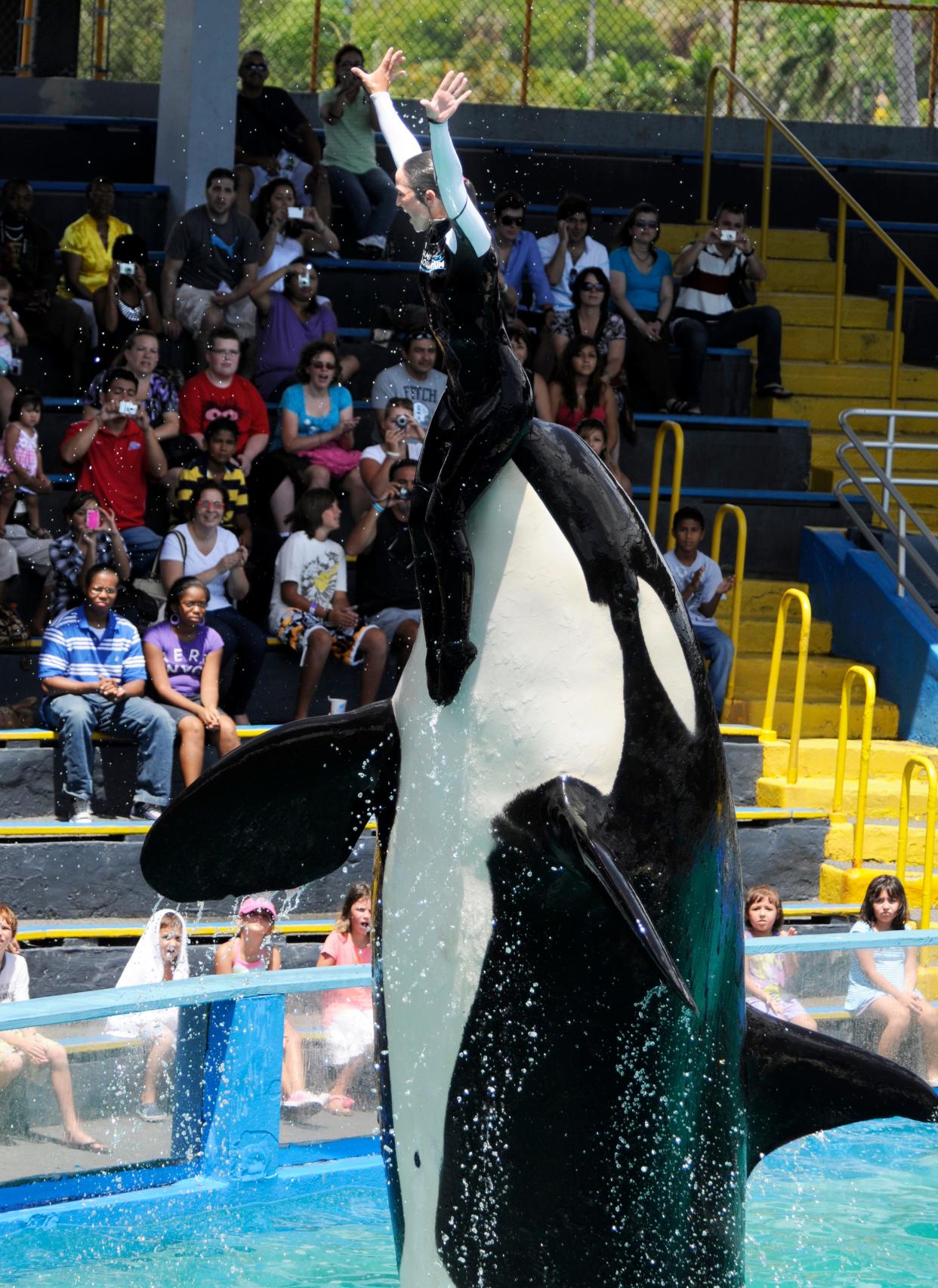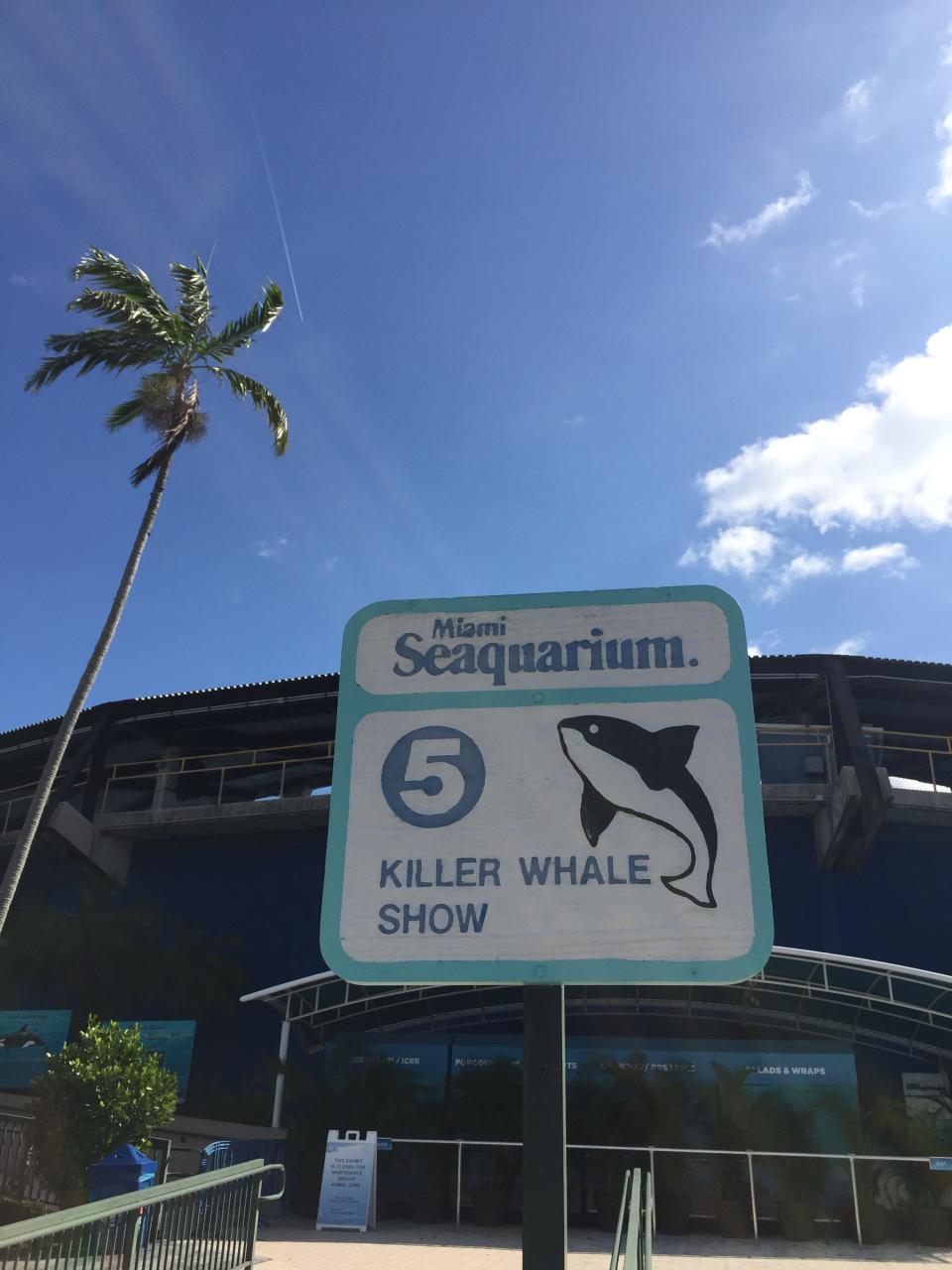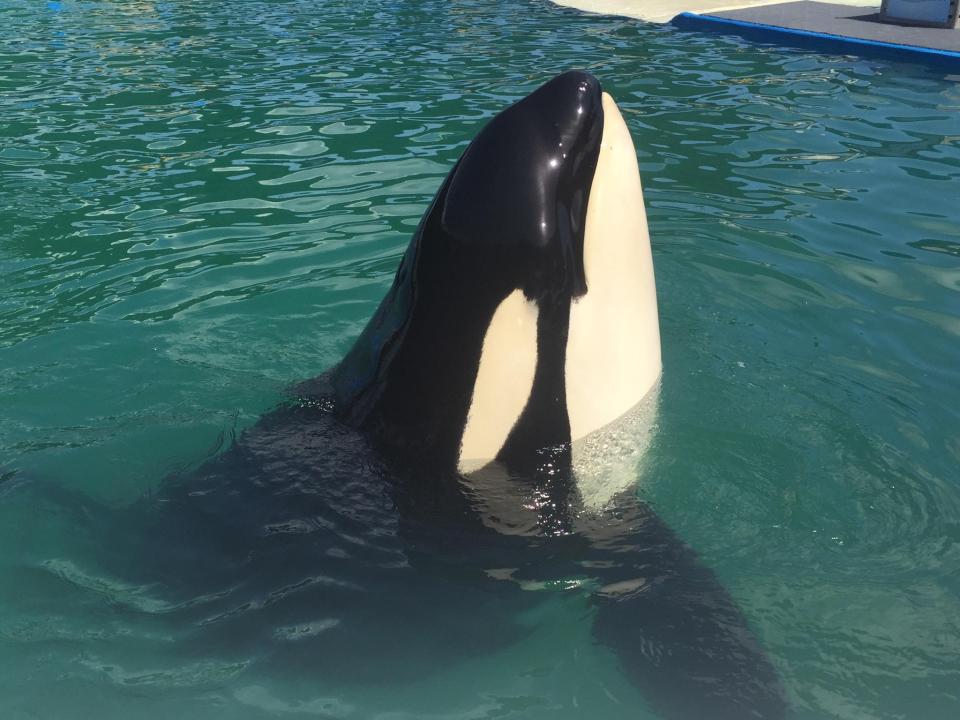Animal rights group wants transparency for captive orca at Miami marine park

The animal rights group that unearthed reports of poor treatment of Lolita the Killer Whale, and later revealed the orca's illness, has appealed to Miami-Dade County officials for transparency about her current status and care.
"In addition to Lolita’s potential transfer, we want to ensure that Miami Seaquarium has already made substantial changes to ensure that she is currently receiving appropriate care," wrote Jared Goodman, general counsel for animal law of the PETA Foundation, in a letter sent Monday.
The letter from the animal rights group comes as activists and advocates of the famed orca, whose plight has captivated a global following, grow concerned over the scarcity of information about her. In the void, recent social media posts have generated anxious buzz.
Dark waters, dark secret: Untold story of failed bid to free South Florida orca Lolita
Lolita the Killer Whale: South Florida activists pray for orca Lolita's release, but back home it's up for debate
Related: Killer whale Lolita will not perform again. But will she be moved to sanctuary?
"Hopefully this is nothing to worry about but there is a crane at MSQ today," read a post on Facebook last week with a photo of a lift over Lolita's stadium at the marine park.
Goodman's letter, sent to county Mayor Daniella Levine Cava and Commissioner Raquel Regalado, followed weeks of virtual silence about Lolita. Last month, Levine Cava and Regalado announced an arrangement with the orca's owner, Miami Seaquarium, for an assessment of her health by independent veterinarians.
That agreement, plus the Seaquarium's decision to retire Lolita as an entertainer, renewed a frenzy of speculation and optimism about the potential release of the orca that has been a captive performer at the marine park for more than half a century.

The actions followed PETA's divulging, a month earlier, that the orca, believed to be in her mid 50s, suffered from pneumonia. The Seaquarium never denied the report, but at the time only acknowledged Lolita was "under the weather."
In his letter, Goodman also referenced even more damning disclosures by PETA last fall. That's when the animal rights advocacy organization revealed allegations by a former Seaquarium veterinarian that the orca was "fed her rotten fish, required her to engage in behaviors that harmed her, and held her in such poor water quality that it injured her eyes."
With federal and state agencies choosing not to exert regulatory watchdog authority over the Seaquarium's care of Lolita, it's up to Miami-Dade County officials, PETA says. In the regulatory vacuum that now exists, PETA said it is calling on county officials to "act immediately and transparently concerning Lolita’s care and their plans for her future," which the organization said it supports transferring her to a seaside sanctuary
"The agencies that could exercise jurisdiction are not doing so," Goodman said. "So we are left with the county, which has assured us they will do the right thing, but then has been pretty much silence."
USDA exempts Miami Seaquarium orca, Pacific porpoises from oversight
Lolita, known as Tokitae by U.S. orca advocates, is now in the hands of a different managerial team at the Miami Seaquarium.
The new company in charge, The Dolphin Co., also owns three other Florida marine animal attractions, including Gulf World in the Panhandle and Marineland in St. Augustine. The company's CEO, Eduardo Albor, has not responded to numerous requests for an interview about the company's plans for its Florida parks.
The Dolphin Co.'s license to run the Seaquarium, issued by the U.S. Department of Agriculture, carved out the orca and the Pacific porpoises that share her tank from the federal agency's regulatory authority.
More: Orca family of Miami Seaquarium’s Lolita on path to extinction as feds mull whale watch ban
Marine life: Why The Whale Trail is greenest way to see marine life in wild
'Under the weather': Miami Seaquarium acknowledges killer whale Lolita has been ill
After the county unveiled the agreement with the Seaquarium for the independent health exam for Lolita, PETA sent a list of recommended veterinarians to Commissioner Regalado.
Goodman said Regalado has not responded. So far, however, it does not appear that independent exam has taken place. Regalado did not respond to a request last week from the Palm Beach Post and the USA Today Florida Network for comment.
Animal rights lawyer said USDA has "washed its hands" of Lolita
USDA officials declined to be interviewed for this article. The agency did say it would answer written questions. But after the questions were submitted, the agency chose not to provide answers.
Instead, it simply issued this blanket statement: "Lolita is currently not being used for any activities covered under the Animal Welfare Act. USDA inspections will continue at the facility for all covered species and activities. Inspection reports, including animal inventories, will be available through the public search tool."

Delcianna Winders, professor and Animal Law and Policy Institute Director
at the Vermont Law School, said the USDA has for a decade neglected its oversight responsibility for Lolita under the federal Animal Welfare Act.
The 1966 law set national standards for humane care and treatment of animals used for commercial purposes, including for display or entertainment at zoos and marine parks. Winders said, in Lolita's case, the small size of her tank at the Seaquarium, the lack of protection from the sun and the absence of social companionship from other orcas all amounted to serious Animal Welfare Act violations.
"Under the law, the outcome here should have been no exhibitor license whatsoever," said Winders, who argued an Endangered Species Act case on Lolita's behalf as well as a challenge to the Seaquarium's license while she worked as a PETA attorney.
Winders, who directed PETA's captive animal law enforcement division, said exempting Lolita from the Seaquarium's license is a "novel" regulatory approach. Doing so, she said, should at least prompt the USDA to put in a place safeguards for her care and needs, and to make sure that the third party team of veterinarians is truly independent and not tied to the attractions industry.
"The USDA apparently wants to wash its hands of the situation after a decade of being complicit in creating it," Winders said. "It puts a tremendous burden on the USDA to make sure that, in light of the novel approach they've taken, they are going to ensure her well being is accounted for given that they are saying they are not going to take responsibility going forward."
It also obligates the USDA, Winders added, to take a proactive approach in working with other federal agencies to seek a better and more appropriate home for her.
"USDA is the agency that was supposed to have been protecting her for all of these years," she said. "It's the least they can do for her, and they owe her at least that much."
Congress oversight of USDA animal welfare missing "piece of the puzzle"
Florida's zoos, marine parks, aquariums and theme park meccas are major draws for many of the 100 million-plus tourists that visit the state every year.
The Florida Association of Zoos & Aquariums, a nonprofit that sets "high ethical standards" for animal care, lists 21 members. They include titans like Walt Disney World's Animal Kingdom, SeaWorld and Busch Gardens.
The organization also includes as members the Palm Beach Zoo & Conservation Society, Lion Country Safari, Brevard Zoo, Jacksonville Zoo and Gardens, Mote Marine Laboratory, Naples Zoo and St. Augustine Alligator Farm.
Despite the presence in Florida of so many zoos, marine parks and aquariums, and their valuable role in the state's all-important tourism industry, the state has limited representation in the Capitol Hill committees that oversee the USDA and its animal welfare law compliance.
The state has just two congressional representatives — out of 50 — on the House Agriculture Committee. And neither of the two, U.S. Reps. Kat Cammack, a Republican, and Al Lawson, a Democrat, come from districts in major tourism centers.
Moreover, neither of Florida's U.S. senators, Marco Rubio and Rick Scott, serve on that chamber's agriculture committee.
Lack of congressional oversight, and little participation from Florida's Washington delegation partly explains the lack of scrutiny on the USDA, according to Winders.
"That is a really big piece of the puzzle," she said. "The Florida situation is unique but there is woefully insufficient congressional oversight of the Animal Welfare Act overall."
Winders said the congressional committees have not held an Animal Welfare Act oversight hearing for many years. Even though, she noted, the USDA's own inspector general has issued reports chiding the agency for failing to enforce the law.
"This is our most important animal protection statute. It impacts millions of animals in every state," she said. "They are just not stepping up. They are letting the USDA get away with not doing the job. And animals are suffering for it, and people, too."
Winders said it's time animal welfare protection is place din a separate agency, as was done on environmental issues through the Environmental Protection Agency.
"The larger problem is that we have asked the Department of Agriculture to protect animals," she said. "Animal protection is very low on their list, if it is on their list at all. It's just a really poor fit for the responsibilities under this statute."
This article originally appeared on Palm Beach Post: PETA calls on Miami Seaquarium transparency about orca Lolita health

